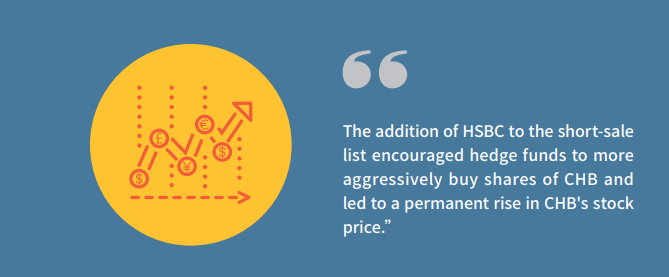A s hedge funds have a significant market influence and are a benchmark for the investment market, investors often discuss their dynamics and fluctuations. So, how does a hedge fund affect the capital market or influence the price of securities?
Research by PHBS Associate Professor Xu Wei and co-authors investigated how the emergence of shortable securities affects hedge funds' purchase on underpriced stocks and how hedge funds' increased involvement in these stocks helps to correct underpricing. In “Arbitrage Involvement and Security Prices” published by the international academic journal Management Science , Associate Professor Xu and co-authors Liu Baixiao, associate professor, Florida State University, and Byoung-Hyoun Hwang, associate professor, Cornell University take two publicly traded banks in Hong Kong as examples: HSBC Holdings (HSBC) and Chong Hing Bank (CHB). In Hong Kong only stocks added to a special list can be shorted.
HSBC was added to the short-sale list in 1994 and became the first publicly traded bank whose shares could be shorted, while CHB had a substantially lower MB (market-to-book ratio) than its industry peers and appeared undervalued. They argue that the addition of HSBC to the short-sale list produced substantial improvements in the ability to hedge industry risk which will encourage hedge funds to more aggressively buy shares of CHB and lead to a permanent rise in CHB's stock price.
Xu and colleagues tested their theory using all trading data from the Hong Kong market. Their first-stage analysis used hedge fund holdings data to show that the emergence of shortable securities, indeed, caused hedge funds to more aggressively buy seemingly underpriced stocks. Their second-stage analysis presented evidence that hedge funds' increased involvement in these stocks helped correct underpricing and moved prices in the direction of fundamentals. However, in industries which already have many shortable securities, the impact caused by the addition of one more security to the short-sale list should not be as strong.
Xu, Liu, and Hwang's study contributes to the literature on what determines hedge fund activity and how hedge fund involvement affects financial markets. The way in which short-selling affects the capital market has been one of the financial community's long-standing concerns. However, previous research focused on how short selling could improve market efficiency through correcting overpricing. Xu and colleagues' research shows that short selling can improve price efficiency by alleviating underpricing as well, and that imposing short-sale constraints can actually cause stock prices to go down or remain at depressed levels.
 By Annie Jin
By Annie Jin
Edited by Priscilla Young
















